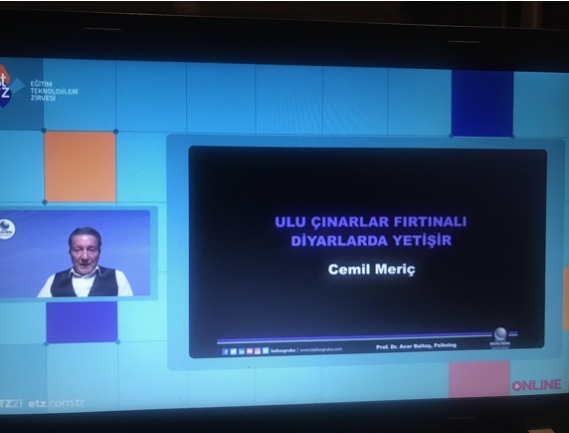Education Technology Summit Highlights
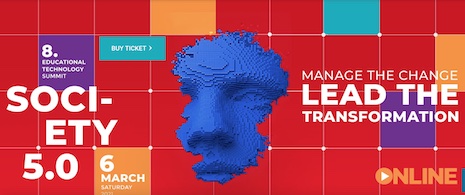
Education Technology Summit Highlights by Suzan Altıparmak, Şila Yosulçay Uz and Deniz Çiçekoğlu
Cem Seymen: Post Pandemic Society, Technology and the Future
Review by Suzan Altıparmak Şila Yosulçay Uz and Deniz Çiçekoğlu
Cem Seymen briefed the audience regarding the impacts of COVID 19 on education and factors that contribute to people’s success in the 7th Education Technology Summit which took place virtually on 6th of March 2021.
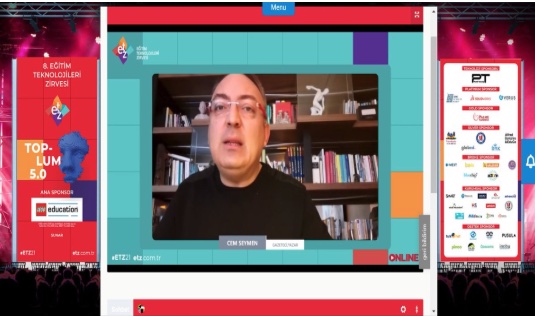 He claimed that the pandemic led to the Mind Revolution. He explained that we should be utilizing this period to unleash our potential as we move towards society 5.0. He said when Covid 19 hit, countries were not fully prepared to treat their citizens and were caught unprepared as in neo-liberal capitalist societies we don’t treat all people in an equitable way. In Italy, 1000 people died a day as the health system wasn’t designed to treat many people at the same time. However, the collective mindset in Eastern countries in which we were brought up helped us enhance our resilient mindset which helped us to protect ourselves and others during this period. On a similar note, he claimed we learned that the governments can not help and sustain all of us and for this reason we became aware of the importance of civic engagement. He continued by saying that in the future we will come across similar situations and hence concerns. According to Seymen, this is why we should stop thinking that humans are superior in the ecosystem and stop consuming, damaging the environment and avoiding being self centered . He also referred to Dostoevsky: “I pity human beings who find relief in others' sufferings” and added that as we evolve to society 5.0, we should learn how to empathize with people and remember that in the future there won’t be individuals. Seymen pointed out that we need to embrace the collective mindset and thus embrace diversity and become more humane. Seymen stated that the current education system doesn’t foster creativity and resilience. Instead, the current society pulls you down when you are successful. However, you can only be successful when you combine passion with compassion. Seymen explained that our souls need to discover and we therefore need to get out of our comfort zone. We turn a blind eye to others because we hold on to our jobs and what we have done so far. So we postpone our dreams to the future. This is why Seymen claims we are not happy as we don’t contribute to our society and ourselves. The question we should be asking ourselves is how we can contribute to ourselves and others. He also added that we need to bridge the gap between our hearts and minds or else we will never be a part of Society 5.0. Z generation says they would like to work in a place that serves a purpose and I really value that. According to him, they ask for money and benefits which managers do not like. They know what they want, however, what is missing in this equation is they are not aware of what they don’t want. He pointed out that what we need is a chance to focus, feel compassion for others, unleashing what we love and creativity. Neither money nor power or status is what we need. In such cases people pull your strings. Your character, etiquette, your generosity, sharing what you have with others is all that matters. He advised us to dream big and have dreams which may contribute to others.
He claimed that the pandemic led to the Mind Revolution. He explained that we should be utilizing this period to unleash our potential as we move towards society 5.0. He said when Covid 19 hit, countries were not fully prepared to treat their citizens and were caught unprepared as in neo-liberal capitalist societies we don’t treat all people in an equitable way. In Italy, 1000 people died a day as the health system wasn’t designed to treat many people at the same time. However, the collective mindset in Eastern countries in which we were brought up helped us enhance our resilient mindset which helped us to protect ourselves and others during this period. On a similar note, he claimed we learned that the governments can not help and sustain all of us and for this reason we became aware of the importance of civic engagement. He continued by saying that in the future we will come across similar situations and hence concerns. According to Seymen, this is why we should stop thinking that humans are superior in the ecosystem and stop consuming, damaging the environment and avoiding being self centered . He also referred to Dostoevsky: “I pity human beings who find relief in others' sufferings” and added that as we evolve to society 5.0, we should learn how to empathize with people and remember that in the future there won’t be individuals. Seymen pointed out that we need to embrace the collective mindset and thus embrace diversity and become more humane. Seymen stated that the current education system doesn’t foster creativity and resilience. Instead, the current society pulls you down when you are successful. However, you can only be successful when you combine passion with compassion. Seymen explained that our souls need to discover and we therefore need to get out of our comfort zone. We turn a blind eye to others because we hold on to our jobs and what we have done so far. So we postpone our dreams to the future. This is why Seymen claims we are not happy as we don’t contribute to our society and ourselves. The question we should be asking ourselves is how we can contribute to ourselves and others. He also added that we need to bridge the gap between our hearts and minds or else we will never be a part of Society 5.0. Z generation says they would like to work in a place that serves a purpose and I really value that. According to him, they ask for money and benefits which managers do not like. They know what they want, however, what is missing in this equation is they are not aware of what they don’t want. He pointed out that what we need is a chance to focus, feel compassion for others, unleashing what we love and creativity. Neither money nor power or status is what we need. In such cases people pull your strings. Your character, etiquette, your generosity, sharing what you have with others is all that matters. He advised us to dream big and have dreams which may contribute to others.
There is no need to be so intimidated by AI as it is not capable of judgement and passing creativity onto others. Instead we should use it to benefit the society from it.
Stephen Krashen: “Some New Hypotheses about How We Learn and What They Mean for Technology”
Review by Şila Yosulçay Uz and Suzan Altıparmak
Stephen Krashen shed light on some new hypotheses regarding how people can learn in the 7th Education Technology Summit which took place virtually on 6th of March 2021.
 One of the hypotheses he talked about was the Path Hypothesis. According to Krashen, people are on different paths and we are all different. We have different strengths and weaknesses. Krashen pointed out that the people who don’t understand this are mostly professional educators. He claimed that when people are on their paths, they enjoy what they do and as a result don’t consider what they are doing as work. According to Krashen, smart people who made great contributions always followed their own interests and tried to solve their problems on their own paths. For example, Thomad Edison stopped going to school due to financial problems and started selling candy on the Grand Trunk Railroad. There he passed by a library which caused him to set up a laboratory for his chemistry experiments and a printing press on the train. Krashen stated that this is a good example of incidental learning which is basically learning something from what people enjoy.
One of the hypotheses he talked about was the Path Hypothesis. According to Krashen, people are on different paths and we are all different. We have different strengths and weaknesses. Krashen pointed out that the people who don’t understand this are mostly professional educators. He claimed that when people are on their paths, they enjoy what they do and as a result don’t consider what they are doing as work. According to Krashen, smart people who made great contributions always followed their own interests and tried to solve their problems on their own paths. For example, Thomad Edison stopped going to school due to financial problems and started selling candy on the Grand Trunk Railroad. There he passed by a library which caused him to set up a laboratory for his chemistry experiments and a printing press on the train. Krashen stated that this is a good example of incidental learning which is basically learning something from what people enjoy.
He said that we need to respect people’s choices and what they find meaning in. Krashen pointed out that learning for a test on the other hand doesn’t work because we don’t put meaning into what we learn that way. He also gave an example to make his point clearer. He said, if you ask a person whether he or she loves you, they won’t have trouble remembering the answer as that concept is attached to certain experiences and emotions. You don’t forget something like that. For this reason learning should be made meaningful so students remember it.
What should schools do?
Krashen also addressed what schools could do. He said schools are places where we find teachers who help us find our paths. For this reason schools should let students experience and experiment. Schools should invite students to find their own path so we can find meaning in what we do. He also stated that intellectual discussion among colleagues facilitates such an environment. He concluded his ideas by saying that education should not only be transferring of experiences to the students but giving students the chance to reflect on them.
Andreas Schleicher: Educating Students for their Future not our Past
Review by Şila Yosulçay Uz and Suzan Altıparmak
Andreas Schleicher talked about how teachers may train their students for their future in the 7th Education Technology Summit which took place virtually on 6th of March 2021.
All teachers had to assume all the roles of an instructor at the same time during the pandemic which has turned out to be a major challenge. Not only education but the economy has also suffered from the pandemic.
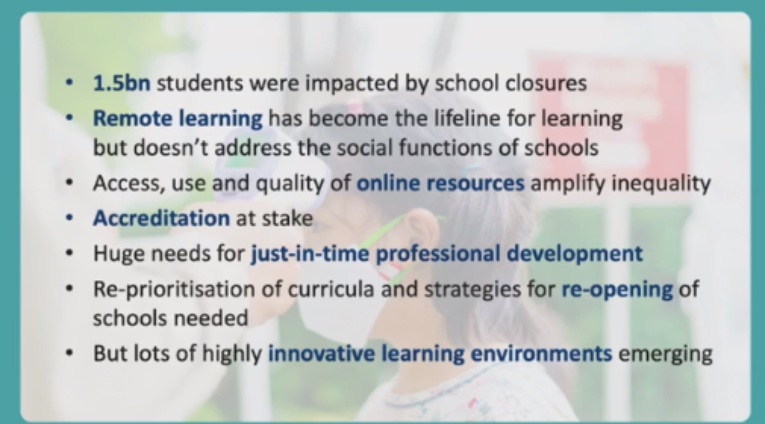
The same is true for Turkish economy as well:
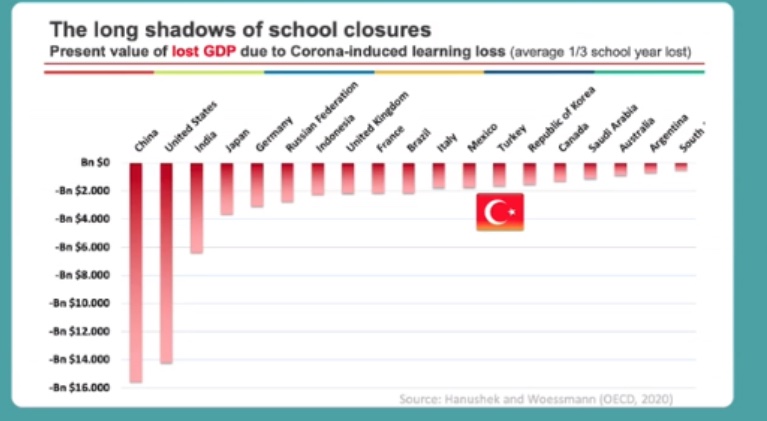
According to 2000 OECD reports of reading scores, reading was just about reading printed material.
2006 reports were not much different, however, how we interacted with the world and each other had started to change. With the emergence of AI in 2015, how we processed information started to change. The world is constantly changing but the education system is not. According to 2018 PISA reports only 9% of 15-year-old students all around the world and only 3.3% of Turkish students can distinguish fact from opinion. Turkey is among progressing countries in the sense that it is trying to integrate more students. The learning outcomes of reading are different now but Turkish students still seem to be having trouble with reading skills. In fact better reading skills can help critical thinking and push the economy upwards.
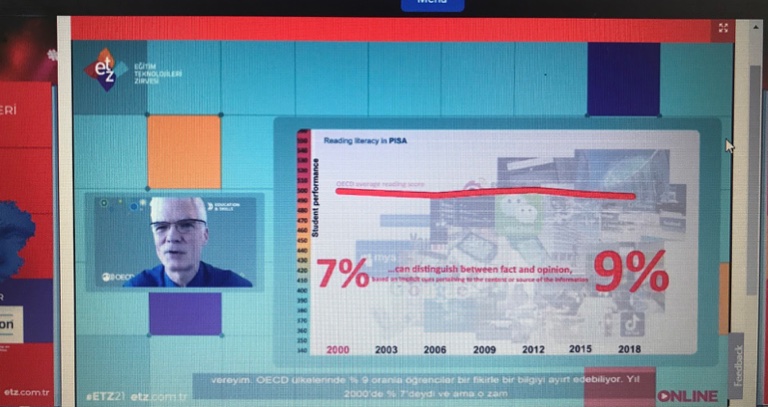
Time spent in schools is quite different in many countries, yet there is no evidence that there is a correlation between time spent at school and productive learning. Productivity is very high in some countries where school time is low and vica versa which means that systematic transformation is needed to balance the input and the output.
The world is no longer offering rewards for what we know but instead for how we use what we know. What is important is what you do with the knowledge you have acquired - can you think like a scientist? Can you think like a historian? If the answer is yes, it is only then that what you have acquired counts. As Schleicher put it ‘The world will only reward you for what you do with what you know’.
Today we need professional “knowledge workers” to design new learning environments as reproducing knowledge has converted itself into creating knowledge.Public schools assumed the role of disseminating knowledge, however, as the world moved from industrial revolution to digital revolution learning is not a transactional phenomena anymore but a social one.
Most students believe that they can not change outcomes and Turkish students are somewhere in the middle of the collected data which shows that a growth mindset is necessary to initiate change.
Resources for education should be used effectively to provide talented teachers for challenging learning environments because there is no room for prescribed teaching anymore. Instead we need ownership of teaching and learning.
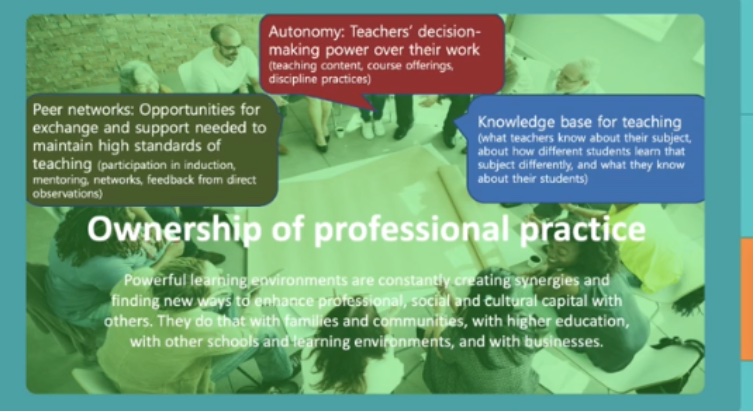
What is most lacking in the context of Turkish education system is that collaborative development is not common among Turkish teachers and actually more teacher involvement is needed in decision making.
Another important issue is that AI, VR, Ar technologies are rapidly developing and they should be integrated more into assessment as it may provide much better data. although resources seem to be limited in terms of technology, Turkey seems to be in a good place with the help of individual efforts.
There will always be different scenarios in the future and it is not possible to guess them all but we can be proactive in terms of education for a better world.
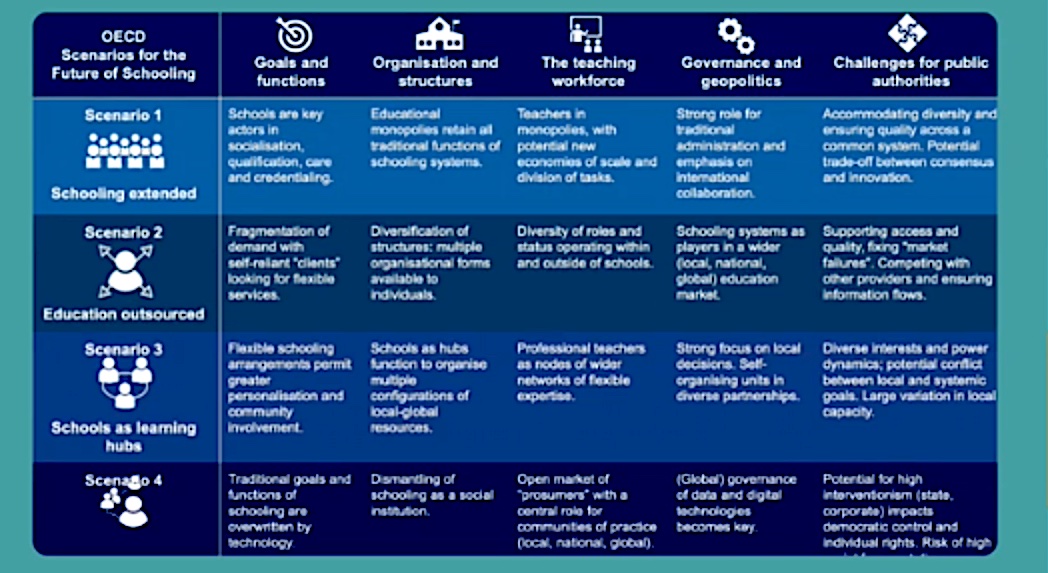
Prof. Dr. Acar Baltaş: The Psychology of the Digital World
Review by Suzan Altıparmak and Şila Yosulçay Uz
 Professor Acar Baltaş enlightened the audience regarding the impacts of COVID 19 on people’s psychology in the 7th Education Technology Summit which took place virtually on 6th of March 2021.
Professor Acar Baltaş enlightened the audience regarding the impacts of COVID 19 on people’s psychology in the 7th Education Technology Summit which took place virtually on 6th of March 2021.
We are going through an era when unpredictable conditions have become predictable. We have so many unknown variables regarding the virus and the vaccine and we are still trying to adapt to the given conditions.
Many of the problems we face, other than the pandemic, arises from communication problems in our relationships. In a society where men believe that they have the right to the last word, it is difficult to apply communication techniques.
There are interesting coincidences everywhere. A Chinese curse says: “May you live in unpredictable times” and the name of the 2019 Venice Biennale was “May you Live in Interesting Times” and now we are all going through unpredictable and interesting times, actually a crisis. A crisis can be defined as a situation when present solutions are inadequate, as is our case now.
There are several predictions regarding the future, like 50% of the world population will work from home, 86 million types of jobs will vanish but 97 million new jobs will arise. As we are going through the Steve Jobs / Bill Gates evolution, some people will lose their function, like horses did when Ford started mass production of cars. Therefore, the new skills required in the 21st century will be:
Cooperation
Relationship management
Creativity
Critical thinking
There will naturally be changes in society, like more women will be part of work life within the work from home culture. One other prediction is that there will be expert teachers on YouTube specialized in their area and will tutor in return for money. However, fiber optic infrastructure is not allowing access to this for everyone, but if Elon Musk succeeds in his Meshnet project everyone will have access to the internet.
Two names that are worth research are Designers of the Future namely Kevin Warwick and Ray Kurzweil. Warwick has made remarkable progress in AI and Kurzweil is an engineer at Google who converts sound into writing and vice versa.
We are having difficulties dealing with the pandemic because, first of all it is vague and secondly freewill is not an endless resource and we are all suffering from “what the hell” effect.
 Unfortunately, we are in such an age that we are watching important events like weddings, graduations behind the small hole of a camera rather than enjoying the moment, we are grouping in echo rooms and suffering from FOMO (Fear of missing out).
Unfortunately, we are in such an age that we are watching important events like weddings, graduations behind the small hole of a camera rather than enjoying the moment, we are grouping in echo rooms and suffering from FOMO (Fear of missing out).
Intelligence is the ability to solve problems while conscience is of emotions which AI finds difficult to mimic. However, new algorithms of AI are now able to make predictions of possible human emotion outcomes and actually this is how Brexit took place and how Trump got elected.
If as predicted, there may be a dramatic amount of unemployment, addictions may increase because working and producing makes individuals feel valued and lack of it could lead to drug use. However, I also foresee that human values will gain more prominence, capitalism could be replaced with socialism and people may come to an understanding that real wealth is not measured in monetary terms. As a result, consumption may decrease and environmental awareness can increase. On the other hand, masses can be surveilled through biological electronic inspection systems. The need for security may result in seeking stronger and more powerful leaders which may result in digital dictators.
The world has been changing since the Big Depression but 2020 is definitely a bookmark we will never forget. The world managed to not collapse with the help of the digital world, which helped us sustain the daily routines of work and education. We finally learned the value of low income workers in the service sector.
We have always pursued happiness but we have now all learnt that happiness is only achieved when we help others, build strong relationships, maintain them and make other people valuable. Constructing our lives is a life long process and we all need to fulfill our roles successfully. Then it is possible to have a story to tell our grandchildren.
